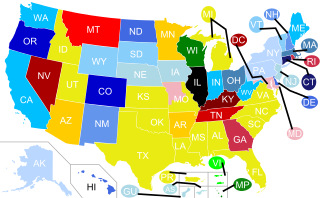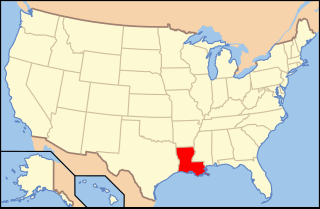Related Research Articles
Lawrence v. Texas, 539 U.S. 558 (2003), is a landmark decision of the U.S. Supreme Court in which the Court ruled that most sanctions of criminal punishment for consensual, adult non-procreative sexual activity are unconstitutional. The Court reaffirmed the concept of a "right to privacy" that earlier cases had found the U.S. Constitution provides, even though it is not explicitly enumerated. It based its ruling on the notions of personal autonomy to define one's own relationships and of American traditions of non-interference with private sexual decisions between consenting adults.
Bowers v. Hardwick, 478 U.S. 186 (1986), was a landmark decision of the U.S. Supreme Court that upheld, in a 5–4 ruling, the constitutionality of a Georgia sodomy law criminalizing oral and anal sex in private between consenting adults, in this case with respect to homosexual sodomy, though the law did not differentiate between homosexual and heterosexual sodomy. It was overturned in Lawrence v. Texas (2003), though the statute had already been struck down by the Georgia Supreme Court in 1998.

Sodomy laws in the United States, which outlawed a variety of sexual acts, were inherited from colonial laws in the 17th century. While they often targeted sexual acts between persons of the same sex, many statutes employed definitions broad enough to outlaw certain sexual acts between persons of different sexes, in some cases even including acts between married persons.

Martin v. Ziherl, 607 S.E.2d 367, was a decision by the Supreme Court of Virginia holding that the Virginia criminal law against fornication was unconstitutional. The court's decision followed the 2003 ruling of the U.S. Supreme Court in Lawrence v. Texas, which established the constitutionally-protected right of adults to engage in private, consensual sex.
Kentucky v. Wasson, 842 S.W.2d 487, was a 1992 Kentucky Supreme Court decision striking down the state's anti sodomy laws that criminalized sexual activity between two people of the same-sex, holding that this was a violation of both the equal protection of the laws and the right to privacy. The Kentucky case helped pave the way for many other states and eventually the United States Supreme Court to issue similar rulings.

Powell v. State of Georgia, S98A0755, 270 Ga. 327, 510 S.E. 2d 18 (1998), was a decision of the Supreme Court of Georgia in the U.S. state of Georgia that overturned its law against sodomy within the state. The Court ruled that the Georgia Constitution granted a right to privacy, and that outlawing oral or anal sex between consenting adults was a violation of the state constitution, thus deeming it "unconstitutional".
The Texas obscenity statute is a statute prohibiting the sale of sex toys in Texas. The law was introduced in 1973, and was last updated in 2003. While the law was never formally repealed, in 2008 a U.S. District Judge released a report declaring it to be "facially unconstitutional and unenforceable."
In American constitutional law, a statute is void for vagueness and unenforceable if it is too vague for the average citizen to understand. This is because constitutionally permissible activity may not be chilled because of a statute's vagueness. There are several reasons a statute may be considered vague; in general, a statute might be void for vagueness when an average citizen cannot generally determine what persons are regulated, what conduct is prohibited, or what punishment may be imposed. For example, criminal laws which do not state explicitly and definitely what conduct is punishable are void for vagueness. A statute is also void for vagueness if a legislature's delegation of authority to judges or administrators is so extensive that it could lead to arbitrary prosecutions. A law can also be "void for vagueness" if it imposes on First Amendment freedom of speech, assembly, or religion.

United States v. Extreme Associates, 431 F.3d 150, is a 2005 U.S. law case revolving around issues of obscenity. Extreme Associates, a pornography company owned by Rob Zicari and his wife Lizzy Borden, was prosecuted by the federal government for alleged distribution of obscenity across state lines. After several years of legal proceedings, the matter ended on March 11, 2009, with a plea agreement by Rob Zicari and Lizzy Borden.
The crime against nature or unnatural act has historically been a legal term in English-speaking states identifying forms of sexual behavior not considered natural or decent and are legally punishable offenses. Sexual practices that have historically been considered to be "crimes against nature" include masturbation, sodomy and bestiality.
John Webb was an American jurist who served as an associate justice of the North Carolina Supreme Court (1986–1998). Prior to serving on North Carolina's highest court, Justice Webb had been a Superior Court (trial) judge and a judge of the North Carolina Court of Appeals.

National Coalition for Gay and Lesbian Equality and Another v Minister of Justice and Others is a decision of the Constitutional Court of South Africa which struck down the laws prohibiting consensual sexual activities between men. Basing its decision on the Bill of Rights in the Constitution – and in particular its explicit prohibition of discrimination based on sexual orientation – the court unanimously ruled that the crime of sodomy, as well as various other related provisions of the criminal law, were unconstitutional and therefore invalid.

Williams v. Pryor, 229 F.3d 1331, rehearing denied, 240 F.3d 944 was a federal lawsuit that unsuccessfully challenged an Alabama law criminalizing the sale of sex toys in the state. In 1998, a statute enacted by the legislature of the State of Alabama amended the obscenity provisions of the Alabama Code to make the distribution of certain defined sexual devices a criminal offense. Vendors and users of such devices filed a constitutional challenge to the statute in the United States District Court for the Northern District of Alabama against William H. Pryor, Jr., in his official capacity as the Attorney General of the State of Alabama. The district court declined to hold the statute violated any constitutional right but determined the statute was unconstitutional because it lacked a rational basis. The State appealed to the Eleventh Circuit Court of Appeals, which reversed the lower court ruling on October 12, 2000.

Lesbian, gay, bisexual, and transgender (LGBT) persons in the U.S. state of Louisiana may face some legal challenges not experienced by non-LGBT residents. Same-sex sexual activity is legal in Louisiana, and same-sex marriage has been recognized in the state since June 2015 as a result of the Supreme Court's decision in Obergefell v. Hodges.
The Anti-Obscenity Enforcement Act of 1998 is an Alabama statute that criminalizes the sale of sex toys. The law has been the subject of extensive litigation and has generated considerable national controversy.

Franklin v. State, 257 So. 2d 21, was a case in which the Florida Supreme Court struck down Florida's sodomy law as being "unconstitutional for vagueness and uncertainty in its language, violating constitutional due process to the defendants." The court retained the state's prohibition on sodomy by ruling that anal and oral sex could still be prosecuted under the lesser charge of "unnatural and lascivious" conduct, thus reducing the crime from a felony to a misdemeanor.
Carey v. Population Services International, 431 U.S. 678 (1977), was a landmark decision of the U.S. Supreme Court in which the Court held that it was unconstitutional to prohibit anyone other than a licensed pharmacist to distribute nonprescription contraceptives to persons 16 years of age or over, to prohibit the distribution of nonprescription contraceptives by any adult to minors under 16 years of age, and to prohibit anyone, including licensed pharmacists, to advertise or display contraceptives.
United States obscenity law deals with the regulation or suppression of what is considered obscenity and therefore not protected speech under the First Amendment to the United States Constitution. In the United States, discussion of obscenity typically relates to defining what pornography is obscene, as well as to issues of freedom of speech and of the press, otherwise protected by the First Amendment to the Constitution of the United States. Issues of obscenity arise at federal and state levels. State laws operate only within the jurisdiction of each state, and there are differences among such laws. Federal statutes ban obscenity and child pornography produced with real children. Federal law also bans broadcasting of "indecent" material during specified hours.
Holmby Productions, Inc. v. Vaughn, 177 Kan. 728 (1955), 282 P.2d 412, is a Kansas Supreme Court case in which the Kansas State Board of Review, the state censorship board, and the attorney defendants appealed the decision of the District Court of Wyandotte County. It was found that the law that allowed the board to deny a request for a permit allowing United Artists to show the motion picture The Moon is Blue in Kansas theaters was unconstitutional, and an injunction was issued prohibiting the defendants from stopping the exhibition of the film in Kansas.
References
- ↑ "Biographical Note". The Margaret Sanger Papers. Sophia Smith Collection, Smith College, Northampton, Mass. 1995. Retrieved 2006-10-21.